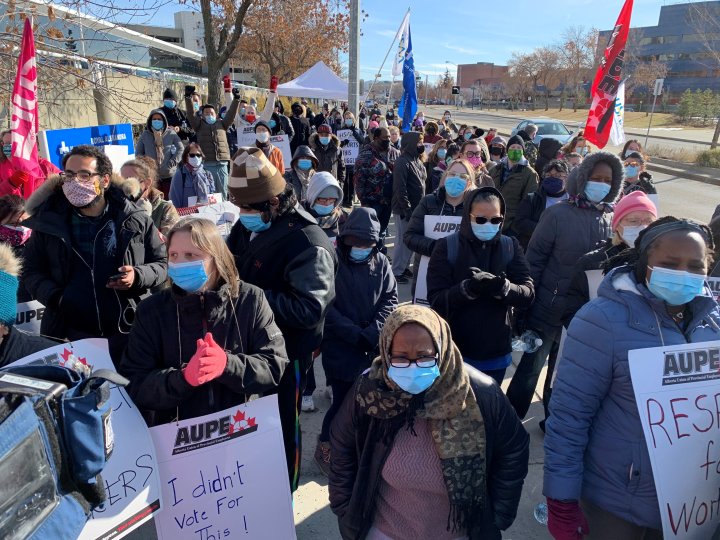
On Oct. 26 of last year, workers all across Alberta staged a wildcat strike in response to the UCP’s decision to lay off 11,000 public health jobs through privatization. At the time of the strike, Alberta Health Services (AHS) predictably warned workers that “anyone joining the pickets will be subject to disciplinary action.” But the scope with which AHS has carried out this threat is astounding: they are slamming at least 800 healthcare workers with sanctions in the midst of a pandemic. The punishments range from letters of reprimand to unpaid work suspensions of up to five days, and eight nurses have even been reported to the College of Licensed Practical Nurses of Alberta. These eight workers could lose their ability to work as nurses. It will require significant funds, mountains of paperwork and countless hours for AHS to process all the grievances they’ve needlessly created. Bonnie Gostola, vice president of the Alberta Union of Provincial Employees (AUPE), says that “AHS has created as many grievances from one day of protest as they would normally face in two years from AUPE.” These sanctions indicate that those at the top of AHS are desperate to stave off further labour revolts, and are resorting to tactics of fear and punishment to do so.
Of course, AHS will not admit their actual motivations. Instead, they claim that “[d]isciplinary actions were issued as appropriate based on role and impact to patient care.” But if AHS was really concerned with impacts to patient care, they would be on the side of the workers who walked out on Oct. 26. These workers were protesting vicious austerity, 11,000 job cuts within healthcare, and the looming menace of privatization, all of which are the real threats to quality healthcare and all of which come from the United Conservative Party (UCP) government. If the UCP had it their way, the healthcare system would operate like a fast food chain: lightning fast, highly profitable, and with every possible penny-pinching shortcut. To claim that the workers who oppose this model are the ones endangering patients is completely false. But it is also unsurprising. Those who want workers off the picket lines will always accuse them of being reckless or dangerous for disrupting day-to-day business, conveniently ignoring that this is exactly the point of a strike! AHS is not punishing their workers for impacting patient care, but because they stepped out of line.
Much fuss has also been raised about the strike’s illegal status, framing the workers as responsible for their legal persecution. Alberta Health Services stated that they had “communicated to staff and AUPE that it would be pursuing action on any illegal activity and staff would not be granted amnesty.” Similarly, UCP Finance Minister Travis Toews announced that the government “will not tolerate illegal strike activity.” But to tell workers under Kenney’s government to follow the law is the same as telling them to remain completely submissive. This is especially true for healthcare workers who are facing cutbacks and job losses. Meanwhile, Bills 1 and 32 effectively make protesting and picketing illegal. Bill 1 bans protesting on “essential infrastructure,” which means a nurse running late outside of a hospital could be considered acting against provincial law. Under the UCP, there is hardly anything a worker can do without breaking the law. AUPE has encouraged workers to file grievances, but it’s clear that playing by these already unjust rules will only invite further aggression. This is the reason AHS had the opportunity to rain down punishment in the first place. One AUPE worker who participated in the strike stated that if union leadership had relied on support from workers and the public when the Labour Relations Board ruled the strike illegal, the workers could have won. The best time for AUPE to act was on the day of the strike, and the absolutely essential time is now.
These sanctions don’t mean that class struggle in Alberta is cooling down anytime soon. In fact, they suggest the opposite. The October wildcat strike represented the boiling over of workers’ anger and a new stage in the Albertan class struggle. Now, these 800 sanctions prove that the ruling class knows and fears this fact. Yet by punishing hundreds of healthcare workers in the middle of a pandemic, AHS could be pouring fuel on the fire of workers’ anger. On the day of the wildcat strike, AUPE president Guy Smith told workers: “they’re going to try to bully you and intimidate you not to be out here. If you stick together and stay strong, nothing can overcome the power of workers standing together—remember that.” This statement was correct, but now AUPE must act on it. They must demand amnesty for all workers and openly begin strike preparation, calling on the UCP to reverse cuts and privatizations, and they must call on the rest of the labour movement to stand with them and do the same. The UCP has shown no signs of slowing their steady stream of attacks on the working class, and the labour movement must begin to seriously fight back.

